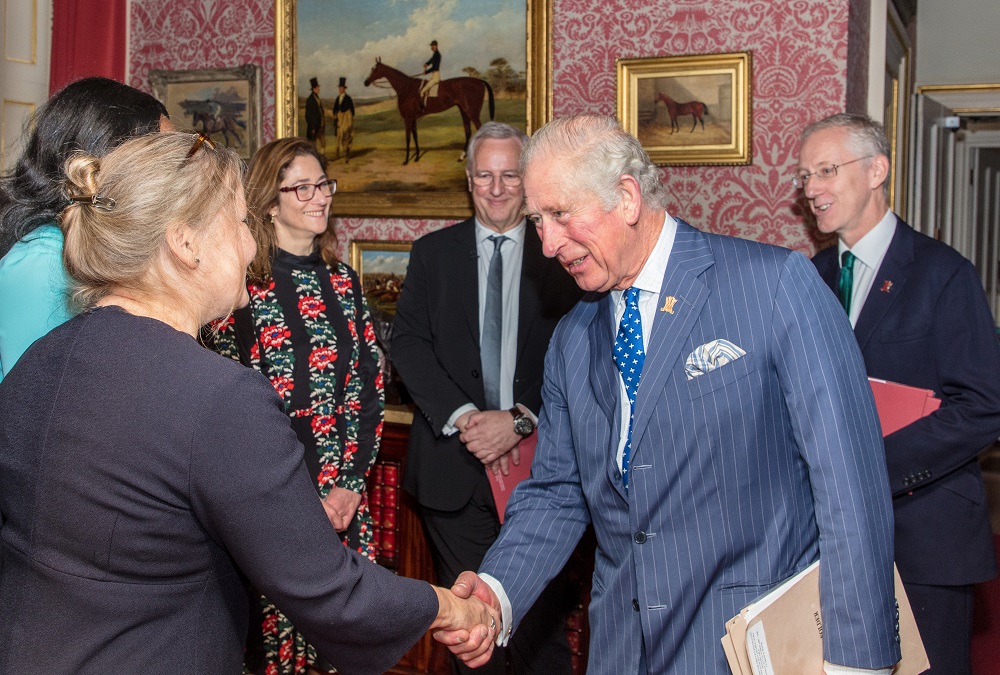As world leaders meet at COP26, our patron HRH The Prince of Wales has stressed the critical importance of sustainable development of cities, collaborative working, and working with, not against, nature if we are to meet crucial climate targets.
During a high level discussion convened by The Prince’s Foundation and key Commonwealth partners, HRH discussed the ‘triple threat’ of rapid urbanisation, natural resource depletion and climate change, and the need for collaboration if the targets are to be met within the limited time now available.

HRH The Prince of Wales attends the Commonwealth Sustainable Cities Summit at Clarence House
HRH, who on the weekend of 30 October attended the G20 summit in Rome, said: “Sustainable development is clearly critical to responding to the climate emergency. The scale of our response needs to be equal to the scale of the challenge we are facing. I sincerely hope the very essence of adding social, environmental and commercial value can help to inspire and guide our actions and responses in the weeks and months ahead.
“There is a real central necessity to look at [rapid urban planning] in a more structured way, which will directly determine so many aspects of our human existence. So if Covid has taught us anything, then surely it has been to demonstrate what can be achieved through collective action. Leadership is key, but so is effective collaboration.
“Institutional investors and the private sector are increasingly coming to realise the real need for transformational change with a much greater degree of focus, at last, of working with Nature rather than against her, as well as being fully alive to the risks of not doing so and merely getting on with business as usual, that approach which would be absolutely fatal.”
Cities already consume more than two thirds of the world’s energy and account for more than 70% of all carbon emissions. From 2015 to 2050, the world’s urban population is expected to almost double, and based on current trends of urban sprawl and unplanned settlements, could mean a tripling of the urban land mass, crushing often fragile eco-systems in the process. Almost 50% of that global urban growth is projected to be in the Commonwealth – well over 1bn more people living in Commonwealth cities. A staggering 95% of that growth is expected to be in Asia and Africa, two continents which are particularly vulnerable to climate change impacts and currently with limited capacity to respond to these intense challenges.
The discussion was therefore convened to highlight the Call to Action on Sustainable Urbanisation across the Commonwealth, a joint initiative of the Commonwealth Local Government Forum, the Association of Commonwealth Universities, the Commonwealth Association of Architects and the Commonwealth Association of Planners. The Call to Action was circulated to Commonwealth Heads of Government in February 2021, highlighting the issues facing the Commonwealth and urging the need for collective inter-disciplinary action to place climate conscious urban planning and management at the heart of the response to climate change. The Commonwealth, with its many shared systems and structures, has the opportunity to lead and model collaborative, inclusive and effective action on sustainable urbanisation, which will be a key priority for CHOGM in Kigali in 2022.
Joining HRH were key voices including the Rt Hon Patricia Scotland, Commonwealth Secretary General, The Executive Director of UN-Habitat Maimunah Sharif, Dr Jeanne d’Arc Mujawamariya the Rwandan Environment Minister and HE Saida Muna Tasneem, the Bangladeshi High Commissioner among others, for a discussion moderated by Bristol City Mayor Marvin Rees.
Eleanor Mohammed, President of the Commonwealth Association of Planners, said: “The Commonwealth Association of Planners believes in order to achieve the elements of the Call to Action, governments at all levels, the professions, academia, and technical experts must work together. We also must take a human centred, nature-based, and climate action approach that reflects the needs, cultures, and well-being of all the world’s citizens. We represent over 40,000 professional planners from 27 countries globally and have a dedicated Youth Network which is particularly important in the context of sustainable urbanisation considering that 60% of the population of the Commonwealth are under 30.”


